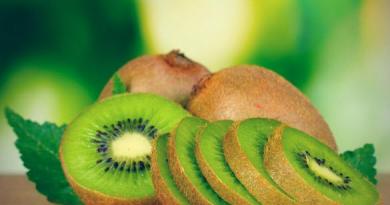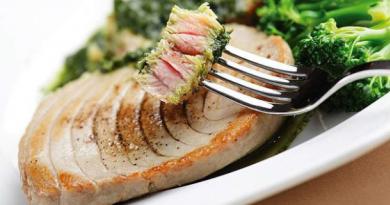Pomegranate is a set of small grains with burgundy flesh, enclosed in a dense peel. The taste of the fruit is most often rich, sweet and sour.
The composition of the pomegranate includes a huge amount of vitamins and useful elements of various categories.
The fruits have medicinal properties and are used in areas such as alternative medicine, cosmetology, and nutrition. It is necessary to use the ingredient in accordance with certain rules. Otherwise, negative consequences may occur.
Pomegranate has minor contraindications, but if they are present, its introduction into the diet must be abandoned.
What is useful?
Medicinal properties have not only fresh pomegranates, but their juice. Positive trends are observed not only in the treatment of individual body systems with sour fruits, but also in their prevention.
The amount of useful substances in the pomegranate decreases only after its heat treatment. This nuance is important to consider if there is a need to take advantage of the healing properties of the fruit.
The benefits of pomegranate for the body:
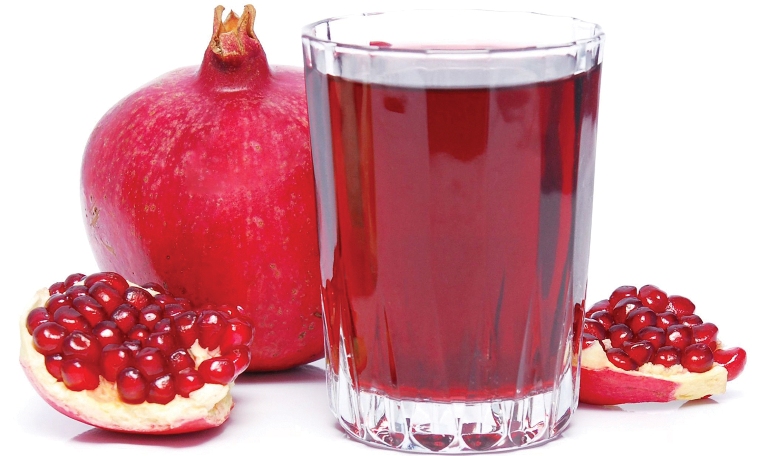 The pomegranate contains an extensive list of useful substances and vitamins of various categories (magnesium, calcium, phosphorus, potassium, iron, etc.). The calorie content of the fruit is low and is approximately 52 Kcal per 100 g. An average pomegranate usually weighs approximately 170-200 g. There is practically no fat in either the pulp or the juice, and the water level is 79.2 g.
The pomegranate contains an extensive list of useful substances and vitamins of various categories (magnesium, calcium, phosphorus, potassium, iron, etc.). The calorie content of the fruit is low and is approximately 52 Kcal per 100 g. An average pomegranate usually weighs approximately 170-200 g. There is practically no fat in either the pulp or the juice, and the water level is 79.2 g.
Nutritional value of pomegranate:
- carbohydrates - 13.9 g;
- proteins - 0.9 g.
The composition of the pomegranate includes:
- tannins;
- glucose;
- cellulose;
- sucrose;
- phosphorus;
- potassium;
- magnesium;
- iron;
- zinc;
- calcium;
- minerals;
- organic acids.
Is there any harm and contraindications?
The use of pomegranate in food is limited to several important rules. Children under 1 year of age should not introduce it into the diet, at the age of 5 years, it is not recommended to offer the baby natural pomegranate juice (it must be diluted with water).
In addition, excessive consumption of pomegranate can lead to negative consequences associated with tooth enamel, bowel function, urinary organs, and other internal systems of the human body. When drinking pomegranate juice, rinse your mouth with clean water.
Contraindications include the following factors:
- diseases of the stomach (gastritis, increased acidity of gastric juice, etc.);
- hemorrhoids (read the article about the treatment of the disease);
- chronic stool disorders (diarrhea, constipation);
- individual intolerance to fruits and a tendency to allergic reactions to them.
The use of pomegranate during pregnancy or lactation- a topic that causes controversy among specialists. It is better to refuse the introduction of fresh fruits into the diet due to the high concentration of components. If pomegranate juice is used, then it must be diluted with water.
Application methods
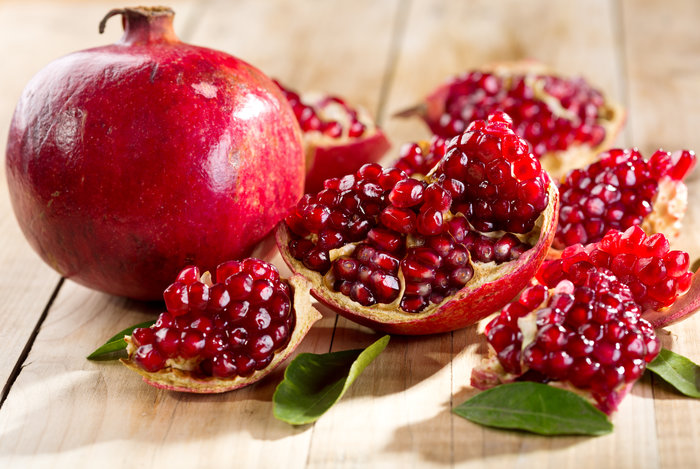 All parts of the pomegranate have beneficial properties. Juice and pulp are widely used in traditional and alternative medicine, peel and seeds - in cosmetology.
All parts of the pomegranate have beneficial properties. Juice and pulp are widely used in traditional and alternative medicine, peel and seeds - in cosmetology.
Thanks to the pomegranate, you can normalize the performance of the body and its individual systems, strengthen hair, nails, and tidy up the skin. Based on the sweet and sour ingredient, numerous masks, decoctions, infusions and healing mixtures are made.
Pomegranate for weight loss:
- pomegranate juice(juice from pomegranates must be extracted independently, mixed in equal amounts with water and consumed every three hours several times a day);
- seeds with olive oil(Pomegranate seeds should be crushed in a blender, mixed with olive oil to make a homogeneous mass, take one teaspoon before meals);
- carrot and pomegranate cocktail(mix equal amounts of pomegranate and carrot juice, drink several times a day).
Pomegranate in folk medicine:
- treatment, as well as colds(half a glass of pomegranate juice is mixed with the same amount of warm water, the mixture is used to gargle several times a day);
- with viral diseases(twice a day you should drink 100 ml of pomegranate juice with a little honey);
- against worms(one tablespoon of pomegranate peel is poured into 250 ml of boiling water, boiled over low heat for 10 minutes, the mixture must be filtered and consumed two tablespoons three times a day).
Pomegranate in cosmetology:
- moisturizing face mask(the procedure should be carried out twice a month, three teaspoons of crushed fruit grains should be mixed with two teaspoons of honey and the mixture should be applied to the skin of the face, after 15-20 minutes the mass is washed off with warm water);
- wrinkle mask(mash or grind the berries of half a medium pomegranate in a blender, add beaten egg white, mix the ingredients and apply on the skin of the face in an even layer, after 30 minutes wash off the mask with warm water);
- to strengthen hair(Pomegranate juice can be used as a hair conditioner, curls become more radiant, strong and look flawless).
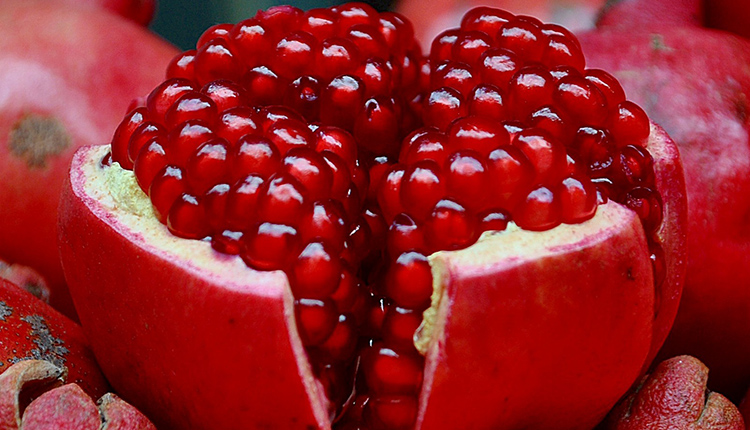 When drinking fresh pomegranates or the juice of these fruits, it is important not to do this on an empty stomach.. The ingredient contributes to the appearance of hunger, so when losing weight, this technique will cause significant discomfort. Appetite will appear immediately after waking up.
When drinking fresh pomegranates or the juice of these fruits, it is important not to do this on an empty stomach.. The ingredient contributes to the appearance of hunger, so when losing weight, this technique will cause significant discomfort. Appetite will appear immediately after waking up.
Pomegranate juice goes well with other ingredients. Regular introduction of such cocktails into the diet will strengthen the immune system and increase vitality. Do not over-eat pomegranate peel. Otherwise, you can harm the body.


